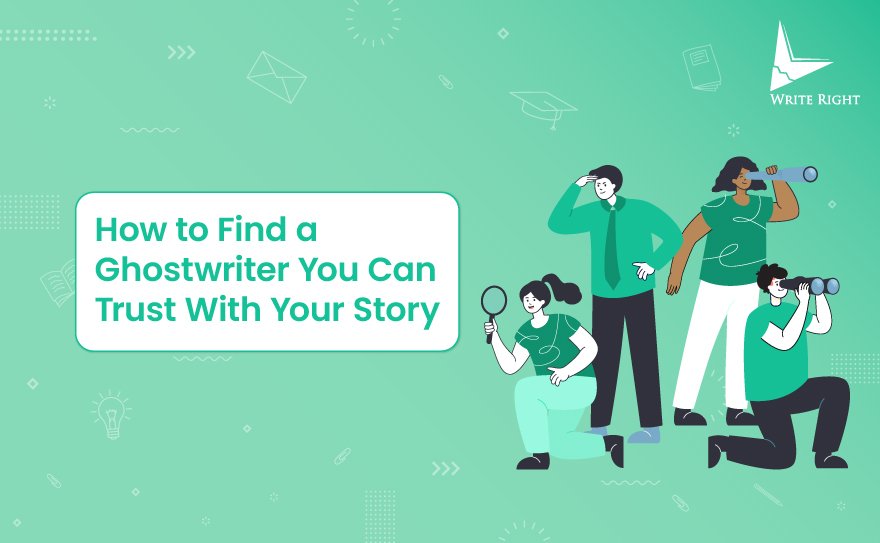Have you ever dreamed of holding a book with your name on the cover, but the thought of staring at a blank page makes you feel like a deer in headlights?
You’re not alone. Many successful authors, from Mark Twain to Stephen King, have utilized the magic of ghostwriting services. Ghostwriting essentially allows you to collaborate with a skilled writer to bring your ideas and expertise to life in a polished and engaging format.
Think of it this way: You’re the architect with a brilliant vision for a building, but you need a skilled construction crew to translate your blueprint into reality. A ghostwriter becomes your trusted partner, transforming your story into a masterpiece that resonates with your target audience.
Defining Your Project: Know What You Need Before You Look
Before diving headfirst into your search for a ghostwriter, take a deep breath and consider the project itself. This initial planning stage might feel uneventful compared to the thrill of the writing process, but it’s crucial and sets the foundation for a successful collaboration.
Here’s a breakdown of some key elements to define before your ghostwriter hunt begins:
- Content Type: Is your project a full-length book, a series of articles, or perhaps a website copy? Knowing the format will help you target ghostwriters with experience crafting that specific type of content. For instance, a ghostwriter who excels at crafting suspenseful novels might not be the best fit for a series of lighthearted travel blog posts.
- Genre: Dive deeper into the genre within the content type. Are you writing a heart-wrenching historical fiction novel, a laugh-out-loud young adult comedy, or a self-help guide for busy professionals? Genre expertise is essential. For example, how would you find a ghostwriter who specializes in historical fiction? You will search for someone who possesses a deep understanding of the research, language, and storytelling techniques necessary to bring your period piece to life.
- Target Audience: Who are you writing for? Understanding your ideal reader is paramount. Are you aiming to inspire young minds with a coming-of-age story or empower entrepreneurs with actionable business advice? Tailoring your content to resonate with your target audience’s specific interests, needs, and reading preferences will ensure your message lands with impact.
- Project Scope: Consider the overall size and complexity of your project. Is it a concise novella, a sprawling epic fantasy series, or a collection of blog posts with a set deadline? Knowing the scope will help you gauge the ghostwriter’s capacity and ensure they have the bandwidth to handle your project effectively.
- Your Voice and Vision: While a ghostwriter will translate your ideas into polished prose, it’s important to retain your unique voice and vision. Do you have a specific tone in mind? Serious and informative? Playful and conversational? Articulating your desired style will guide the ghostwriter in capturing your essence within the narrative.
By defining these key project elements, you’ll be well-equipped to find a ghostwriter with the perfect blend of experience, genre knowledge, and writing style to bring your story to life and resonate with your target audience.
Finding Your Perfect Match: Exploring Avenues for Ghostwriter Discovery
With a clear understanding of your project in hand, it’s time to embark on your quest for the ideal ghostwriter. Here’s a breakdown of some popular avenues to explore, each with its own advantages and considerations:
- Freelance Marketplaces: Platforms like Upwork and Fiverr offer a vast pool of freelance writers, including ghostwriters eager to showcase their talents. This approach allows for budget flexibility, as you can browse profiles and set your desired rate. However, the sheer number of options can be overwhelming. Be prepared to invest significant time in vetting candidates to ensure you find a qualified writer. Look for writers with experience in your specific genre, positive client reviews, and writing samples that resonate with your vision.
- Ghostwriting Agencies: Reputable ghostwriting agencies act as a curated marketplace, offering a network of pre-vetted writers who specialize in various genres and content types. This saves time and effort in the initial screening process, as agencies typically assess a writer’s skills and experience before adding them to their roster. Additionally, agencies often handle contract negotiations and project management, streamlining the collaboration. However, agency fees can be higher than those of directly hiring a freelancer.
- Referrals: Don’t underestimate the power of word-of-mouth recommendations. This is one of the best methods on how to find a ghostwriter. Reach out to published authors, editors, or writing communities you trust. Ask if they have any ghostwriters they recommend. Referrals from established figures in the industry can lead you to highly skilled ghostwriters with a proven track record. This approach fosters a sense of trust and confidence, knowing the recommended writer has already impressed someone you respect.
- Industry Events and Conferences: Attending industry events or conferences focused on writing and publishing can be a fantastic way to connect with potential ghostwriters. These events offer opportunities to network with professionals, attend workshops, and gain insights into the ghostwriting services world. You might even meet a ghostwriter directly whose expertise aligns perfectly with your project.
- Online Ghostwriting Directories: Several online directories specialize in connecting authors with ghostwriters. These directories often allow you to filter your search by genre, experience level, and budget. While some directories require a subscription fee, they can be a valuable resource for narrowing down your search and finding qualified writers actively seeking ghostwriting projects.
By exploring these diverse avenues with a clear understanding of your project needs and budget, you’ll significantly increase your chances of finding the perfect ghostwriter to bring your story to life. Remember, the ideal ghostwriter becomes your partner in this creative endeavour. Take your time, conduct thorough research, and trust your gut feeling to find the writer who best complements your vision and brings your project to fruition.
Evaluating Expertise: Assessing a Ghostwriter’s Qualifications
How to find the perfect ghostwriter? Finding the one is akin to unearthing a hidden gem – a skilled collaborator who complements your vision and elevates your story. To ensure you discover this literary treasure, a meticulous evaluation of a ghostwriter’s qualifications is essential. Here are some key factors to meticulously analyze:
- Experience: Solid experience within your chosen genre is paramount. Look for ghostwriters with a proven track record of success in crafting compelling narratives that resonate with your target audience. Their portfolio should showcase a variety of projects that demonstrate their versatility and ability to adapt their writing style to different genres. Don’t just skim their portfolio; delve deeper. Read excerpts from projects similar to yours. Do they capture the essence of the genre? Does the writing flow seamlessly and engage the reader? Pay attention to details like dialogue, pacing, and world-building, ensuring the ghostwriter can effectively translate your vision into a captivating narrative.
- Genre Knowledge: In-depth genre expertise is a game-changer. A ghostwriter who understands the conventions, tropes, and reader expectations of your specific genre possesses a valuable advantage. They can seamlessly weave your story into the existing framework, ensuring it feels authentic and resonates with your target audience. Look for ghostwriters who actively engage with the genre, perhaps through blog posts, reviews, or even published works within the same category. This demonstrates their passion for the genre and their commitment to staying current with trends and reader preferences.
- Writing Style: While you’ll be collaborating closely, it’s crucial to find a ghostwriter whose writing style complements your vision. Read writing samples from their portfolio, paying close attention to voice, tone, and sentence structure. Does their voice feel overly formal when your project requires a conversational tone? Can you imagine your story being told in their distinctive style? Finding a perfect stylistic match isn’t about complete uniformity. It’s about ensuring their strengths align with your project’s needs. Perhaps you have a strong grasp of plot and character development but struggle with crafting evocative descriptions. A ghostwriter who excels at descriptive prose can elevate your story without compromising your unique voice.
- Communication Skills: Effective communication is the lifeblood of any successful collaboration. During the interview process, assess the ghostwriter’s communication style. Do they respond promptly to your inquiries? Are they clear and concise in their explanations? Effective communication fosters trust and ensures both parties are on the same page throughout the project.
- Research Skills (if applicable): Strong research skills can be invaluable depending on your project. Historical fiction or nonfiction projects often require meticulous research to ensure factual accuracy and historical context. Evaluate the ghostwriter’s approach to research. Does the ghostwriter demonstrate a commitment to sourcing credible information and seamlessly weaving it into the narrative?
- Contractual Understanding: Ghostwriting service agreements are legally binding documents that outline the terms of your collaboration. Ensure the ghostwriter has a solid understanding of contractual agreements. During the interview, discuss the ghostwriter’s experience with ghostwriting contracts and their willingness to negotiate terms that are fair and beneficial for both parties.
By meticulously evaluating these key factors, you’ll be well-equipped to identify a ghostwriter who possesses the perfect blend of experience, genre knowledge, writing style, and collaborative spirit. Remember, a ghostwriter shouldn’t simply translate your ideas; they should become your trusted partner, elevating your story and bringing your vision to life.
Building Trust and Communication: The Heart of a Successful Partnership
The success of your collaboration with a ghostwriter hinges on two fundamental pillars: clear communication and a strong foundation of trust. Here’s how to nurture this vital partnership and ensure a smooth, productive journey:
1. Conducting Insightful Interviews
Before making your final decision, schedule in-depth interviews with shortlisted ghostwriters. This is your opportunity to delve deeper into their experience, process, and personality. Here are some key areas to explore:
- Project Deep Dive: Walk the ghostwriter through your project in detail. Discuss your vision, target audience, and any specific requirements you might have. Observe their level of engagement and enthusiasm. Do they ask insightful questions that demonstrate a genuine interest in your story?
- Process Exploration: Uncover the ghostwriter’s typical workflow. How do they approach research, drafting, and revisions? Do their methods align with your preferred working style? Understanding their process will help you determine potential areas of collaboration and potential roadblocks to address upfront.
- Gauging Understanding: Present a writing sample or a brief writing prompt relevant to your project. Ask the ghostwriter to walk you through their thought process and approach. This exercise will reveal their ability to understand your vision and translate it into compelling content.
2. Setting Clear Expectations: A Collaborative Contract
A well-defined contract acts as the roadmap for your ghostwriting services collaboration. Draft a contract (or have a lawyer assist you) that outlines essential elements such as:
- Deadlines and Deliverables: Establish clear deadlines for each project phase, from initial drafts to revisions and final delivery. Outline the specific deliverables expected at each stage, ensuring both parties are on the same page regarding the scope of work.
- Communication Protocols: Define preferred communication methods (email, phone calls, etc.) and establish a communication frequency that fosters a collaborative environment. This avoids confusion and ensures you’re both kept in the loop throughout the project.
- Revisions and Feedback: Clarify the revision process. How many rounds of revisions are included? How will feedback be provided? Establishing clear expectations upfront minimizes potential misunderstandings and ensures you receive the polished final product you envision.
- Payment Terms: Outline a payment schedule that aligns with project milestones or deliverables. Be transparent about your budget and clearly define the ghostwriter’s rates.
3. Open Communication: Fostering a Collaborative Spirit
Remember, your ghostwriter is your partner in this creative endeavour. Maintaining open communication is essential for a successful collaboration.
- Regular Check-ins: Schedule regular check-ins with your ghostwriter to discuss progress, address any concerns, and provide feedback. This fosters an ongoing dialogue and ensures your vision stays at the forefront of the project.
- Sharing Drafts: Be open to sharing drafts with your ghostwriter early and often. Their expertise can help identify potential weaknesses and ensure your story reaches its full potential.
- Welcoming Suggestions: While you’re the ultimate authority over your story, be receptive to your ghostwriter’s feedback and suggestions. Their experience can often unearth valuable insights you might have overlooked.
- Maintaining Respect: Respect your ghostwriter and value their expertise. This fosters a positive working relationship that benefits both parties and ultimately leads to a more successful outcome.
By fostering a collaborative environment built on trust and clear communication, you can transform your ghostwriting partnership into a powerful force. Together, you can bring your story to life and share it with the world.
Your Story Awaits!
Finding the right ghostwriter can feel daunting, but with careful planning and a strategic approach, you’ll be well on your way to achieving your literary goals. Remember, the ideal ghostwriter becomes an extension of yourself, a skilled storyteller who captures your unique voice and amplifies your message. So don’t be afraid to invest the time in finding the perfect fit.
Here’s a quick recap:
- Define your project clearly: Know what you’re writing and who you’re writing for.
- How to find a ghostwriter: Consider freelance platforms, agencies, or referrals.
- Evaluate a ghostwriter’s qualifications: Look for experience, genre knowledge, and a compatible writing style.
- Build a strong foundation: Foster clear communication and set expectations through interviews and contracts.
With the right ghostwriter by your side, you can transform your story from a dream into a published reality. Now, get out there and start your search! The world awaits your masterpiece.






